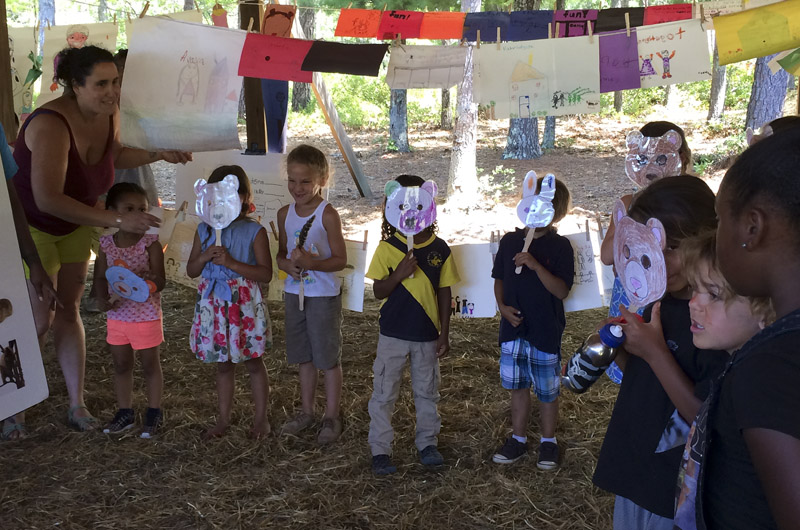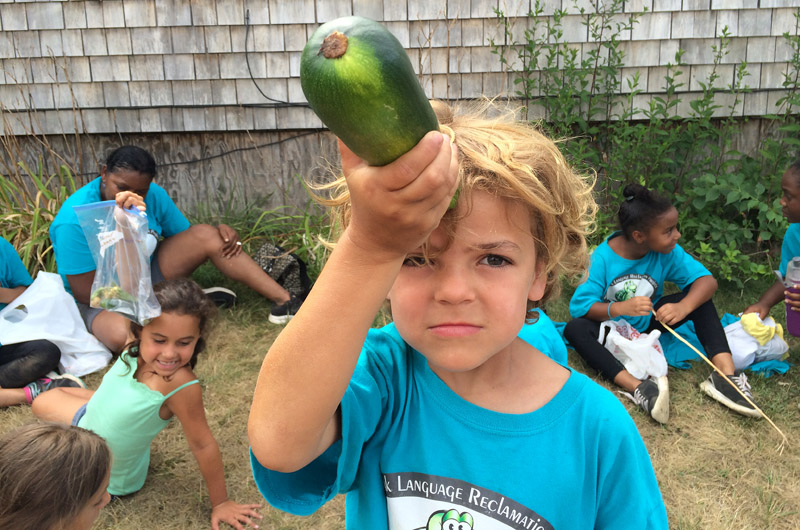The Wopanaak Language Reclamation Project, based in Mashpee, plans to co-launch a language immersion preschool next fall, marking a major milestone in its efforts to revive the original language of the region.
The preschool will occupy space in the Montessori Academy of Cape Cod in North Falmouth. Participating families will have access to state and federal child care vouchers to help cover the costs.
“It’s been a continuum of grant funding efforts since 2010, working toward this longer range goal of opening some sort of language immersion school,” Jennifer Weston, director of the Mashpee Wampanoag Tribe Language Department, told the Gazette this week.

The group also plans to begin offering an after-school language program for students in kindergarten through eighth grade in Mashpee in January. That effort is aimed partly at implementing the vast amount of language curriculum the group has developed since 2012.
Both programs will be open to members of the Mashpee and Aquinnah tribes, along with the Assonet and Herring Pond bands and other Wampanoag communities.
Earlier efforts to open a language immersion charter school on the Cape had failed to gain the required state support. A second application this year made it to the final round in October, but in light of pending state legislation related to charter schools and other uncertainties, the WLRP decided to change course.
“We wanted to make sure that we could guarantee some kind of immersion school for tribal families this fall,” said Ms. Weston, who is coordinating the immersion school efforts. “Unfortunately, the charter application process just didn’t offer that level of certainty.”
Last summer, a partnership between the Mashpee tribe’s child care program and the Montessori Academy initiated a training program for WLRP teachers to obtain Montessori certification. That led to a new focus on preschool and kindergarten programs.
But as with the proposed charter school, the nearly two-hour daily commute to North Falmouth would likely be a major hurdle for families living on the Island.
“I think that will be very difficult,” said Durwood Vanderhoop, a tribal member who lives in Aquinnah with his wife and two toddler sons. “That’s kind of self-defeating if we’re sending people over on the boat. It’s really difficult to send a preschooler over, especially.”
Mr. Vanderhoop taught an after-school program in traditional Native American singing in Aquinnah this fall, incorporating elements of the Wampanoag language. Along with the regular classes in Mashpee, language programs in Aquinnah happen throughout the year, he said, but the shortage of certified teachers in Aquinnah limits the options for the Island.
“Last summer we brought 10 to 12 Aquinnah students to participate in our Summer Turtle Program every Friday and we ended up spending probably two-plus hours of that time in traffic, just on this side of the ferry,” Ms. Weston said. “So it is definitely a challenge.”
The WLRP has discussed the possibility of a dedicated tribal van to bring students back and forth for the programs, but Ms. Weston noted that it might not be suitable for preschool-aged children to have to travel to Mashpee and back every day. She believed a more realistic plan would be to develop a separate Island school in the future once the Mashpee school gets off the ground.
“I think it has been part of the big-picture discussions for a number of years now,” she said.
The language reclamation project started in 1993 under the direction of Jessie Little Doe Baird, and the late Helen Manning of Aquinnah. She also studied Algonquian linguistics at MIT as part of her efforts to research and standardize the Wopanaak language. In 2010 Mrs. Baird won a prestigious MacArthur grant in recognition of her work. The 2011 PBS documentary We Still Live Here follows the work of the project, and features several members of the Mashpee and Aquinnah tribes.
In 2012 the WLRP received funding from the federal Administration for Native Americans to begin the charter school planning process and develop school curriculums.
Many letters and legal documents written in the language are preserved in archives and private collections throughout the region, including the Dukes County archives. Three versions of the King James Bible were translated into Wopanaak by European missionaries in the 1600s, making up the largest body of native written records in the country.
Mr. Vanderhoop, one of two certified teachers in Aquinnah, remembers looking through historic texts as a young man for traces of his ancestral language. He began taking classes through the WLRP around 2000 and now uses the language every day. “There is enough that’s been restored so that we can have conversations without uttering a non-Wampanoag word,” he said.
“We are still in the infancy of this whole program,” he added. “We are just starting to have a generation that’s been raised hearing it every day, or on a much more regular basis from birth on up.”
Ms. Weston agreed. “It’s reasonable to say that the language reclamation program is going to continue for many generations to come,” she said. “I think the Wampanoag language, like English, will always be changing and growing.”
While the WLRP has yet to fully bridge the Island and Cape communities, Mr. Vanderhoop believed it has helped strengthen the tribe. “It’s something that’s uniquely ours,” he said of the language, which 20 years ago was nearly extinct. “It’s definitely brought us together on many levels.”
“A lot of people have yet to take a class or be directly impacted,” he added. “I think there is a lot of good that’s been done and a lot of good that can be brought out of this.”









Comments (1)
Comments
Comment policy »